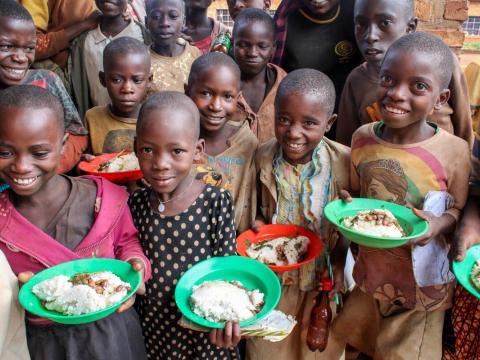
Raising our hands for a healthier and greener tomorrow
Ahead of Earth Day 2024, Kevin Weseni, Senior Food Assistance Advisor for the Global Hunger Response at World Vision International, underscores the significance of school feeding programmes in combating climate change and gives insights into ways they can foster sustainability.
Throughout my years of humanitarian service, I have witnessed the immense challenges faced by vulnerable communities. From my trip to La Gonâve, Haiti to assist the community following the catastrophic 7.0 magnitude earthquake in 2010 to working for decades in countries where food insecurity looms over vulnerable children's lives, I’ve seen the challenges that come with working in this field. Yet, even after all these hardships and long hours, I still have hope. School feeding programmes helped to plant these seeds of optimism.
The approach of school feeding programmes has evolved for centuries. After initially serving as an opportunity to alleviate hunger, many organisations now embrace a more holistic approach that includes nutritional education as well as a commitment to environmental sustainability. World Vision stands at the forefront, an integral member of the School Meals Coalition, dedicated to ensuring no child goes to bed hungry while also weaving support across several sectors like climate action, food systems transformation, and peace building. Through our efforts with the coalition, we have supported over 1.4 million children and are committed to reaching even more.
I am immensely proud of the work we’ve been able to do thus far with school meals programmes. They not only provide essential nutrition to students, but they cultivate higher levels of concentration needed for sustained excellence in their studies as well. In fact, recent studies have found that well-fed students are more engaged in their learning, have better cognitive function, and all children - especially girls - are less likely to be absent from school.
School feeding programmes can also greatly support the growth of local economies. For example, a recent collaboration between the World Food Programme (WFP) and the Haitian government launched the Buy Local campaign. School meals, using food sourced from local providers, are provided to children in vulnerable communities. This way, farmers benefit from a regular buyer at a fair price while nourishing vulnerable children. World Vision has also been able to continually partner with WFP and carry out these home-grown school feeding programmes in places like Burundi and Central African Republic.
Further, these programmes are often the largest source of government procurement of food. As a result, making these meals more sustainable can have a substantial impact on a country’s greenhouse gas emissions. With local sourcing, carbon-spewing trucks no longer must travel as far. This minimises food waste and communities can lessen their carbon emissions. It’s an eco-friendly way of producing and consuming food - like giving the planet a high-five!
By prioritising sustainable practices in our school feeding programmes and empowering communities to take control of their food systems, we can create school feeding programmes that work better for students, their communities, and the planet at large.
Here’s how we can move forward:
Establishing nutrient rich, diverse, climate-resilient, and locally sourced menus featuring whole grains, legumes, fruits, and vegetables, when available.
Supporting and leveraging community members and other stakeholders to ensure quality delivery of foods from nearby farmers or producers.
Engage in climate-smart agriculture to guide transformation of agri-food systems.
Prioritise holistic food education with real-life and practical activities like growing school gardens and connecting food systems, climate change, and environmental impacts to national curricula.
Engage and advocate for climate and environmental considerations when discussing school food procurement and school feeding programmes with policymakers and other community leaders.
There’s no better time to reaffirm our commitment to support and push for these initiatives than on Earth Day. If we can do that, I have a renewed hope we will be able to nourish minds, bodies, and the environment while setting the course for brighter, greener tomorrow.
Learn more about the School Meals Coalition here.
Kevin Weseni is a Senior Food Assistance Advisor for World Vision’s Global Hunger Response. He has over two decades of experience in a variety of areas including food assistance, grants management, and school feeding programmes.

